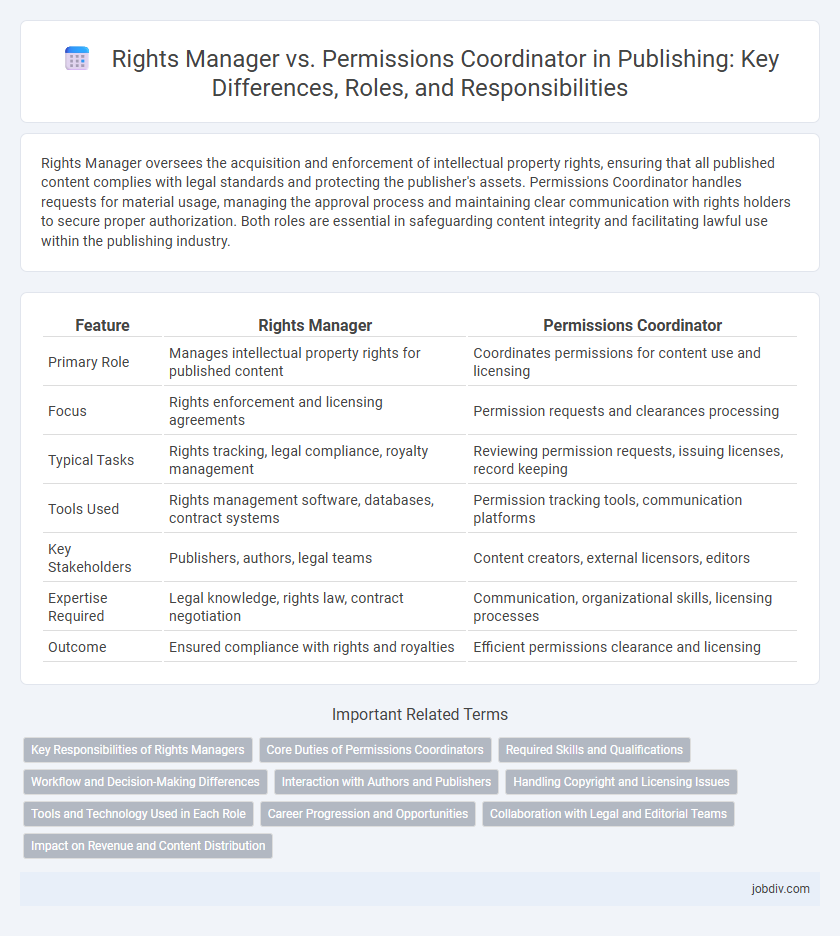Rights Manager oversees the acquisition and enforcement of intellectual property rights, ensuring that all published content complies with legal standards and protecting the publisher's assets. Permissions Coordinator handles requests for material usage, managing the approval process and maintaining clear communication with rights holders to secure proper authorization. Both roles are essential in safeguarding content integrity and facilitating lawful use within the publishing industry.
Table of Comparison
| Feature | Rights Manager | Permissions Coordinator |
|---|---|---|
| Primary Role | Manages intellectual property rights for published content | Coordinates permissions for content use and licensing |
| Focus | Rights enforcement and licensing agreements | Permission requests and clearances processing |
| Typical Tasks | Rights tracking, legal compliance, royalty management | Reviewing permission requests, issuing licenses, record keeping |
| Tools Used | Rights management software, databases, contract systems | Permission tracking tools, communication platforms |
| Key Stakeholders | Publishers, authors, legal teams | Content creators, external licensors, editors |
| Expertise Required | Legal knowledge, rights law, contract negotiation | Communication, organizational skills, licensing processes |
| Outcome | Ensured compliance with rights and royalties | Efficient permissions clearance and licensing |
Key Responsibilities of Rights Managers
Rights Managers oversee the identification, acquisition, and administration of intellectual property rights for published content, ensuring proper licensing and compliance with copyright laws. They coordinate with authors, legal teams, and third parties to negotiate rights agreements and monitor usage to prevent infringements. Their role is critical in maximizing revenue streams while safeguarding the publisher's legal interests and intellectual assets.
Core Duties of Permissions Coordinators
Permissions Coordinators manage the acquisition and clearance of rights for publishing projects, ensuring legal compliance and proper usage of copyrighted materials. Their core duties include negotiating licenses, tracking permissions requests, and maintaining detailed records to prevent copyright infringements. Unlike Rights Managers who oversee broader rights strategies, Permissions Coordinators focus specifically on the operational aspects of securing and documenting permissions for content use.
Required Skills and Qualifications
Rights Managers require strong expertise in intellectual property law, contract negotiation, and digital rights management systems to effectively oversee licensing agreements and protect content assets. Permissions Coordinators need detailed knowledge of copyright regulations, excellent organizational skills, and proficiency in managing permission requests and record-keeping workflows to facilitate lawful content use. Both roles demand excellent communication abilities and attention to detail, with Rights Managers often requiring advanced degrees in law or publishing, while Permissions Coordinators benefit from backgrounds in library science or publishing studies.
Workflow and Decision-Making Differences
Rights Managers oversee the entire content lifecycle by securing intellectual property rights, negotiating licenses, and ensuring legal compliance, which enables strategic decision-making in content distribution. Permissions Coordinators focus on processing requests, managing access controls, and maintaining accurate records of granted permissions, streamlining the operational workflow. The Rights Manager handles high-level authorization and policy enforcement, while the Permissions Coordinator supports day-to-day permission tasks within the publishing workflow.
Interaction with Authors and Publishers
Rights Managers negotiate and secure licensing agreements, ensuring clear usage terms for authors and publishers to maximize revenue and protect intellectual property. Permissions Coordinators handle requests for third-party content use, verifying proper approvals and maintaining compliance with copyright laws. Effective collaboration between these roles streamlines communication, facilitates rights clearance, and supports smooth content distribution.
Handling Copyright and Licensing Issues
Rights Managers ensure proper copyright enforcement by monitoring content usage, managing licensing agreements, and resolving infringement disputes. Permissions Coordinators handle the administrative tasks of obtaining and documenting permissions for content reproduction, distribution, and adaptation. Together, they maintain legal compliance and protect intellectual property within publishing workflows.
Tools and Technology Used in Each Role
Rights Managers utilize digital rights management (DRM) software and blockchain technology to protect intellectual property and automate license tracking. Permissions Coordinators rely on content management systems (CMS) and rights clearance platforms to secure and document permissions efficiently. Both roles leverage database tools and royalty tracking systems to ensure accurate usage and compliance.
Career Progression and Opportunities
Rights Manager roles focus on negotiating and managing intellectual property rights, providing career progression into senior legal or business development positions within publishing houses. Permissions Coordinator positions emphasize processing and granting usage rights, offering opportunities to advance into rights management or editorial support roles. Experience in Permissions Coordination often serves as a foundational step toward becoming a Rights Manager, expanding expertise in copyright and licensing negotiations.
Collaboration with Legal and Editorial Teams
Rights Managers ensure seamless collaboration with legal and editorial teams by overseeing copyright clearance and licensing agreements, preventing content disputes. Permissions Coordinators facilitate communication between authors, publishers, and legal departments to secure necessary permissions for content use and reproduction. Both roles are critical in maintaining compliance and streamlining the approval process for publishing projects.
Impact on Revenue and Content Distribution
Rights Managers directly influence revenue streams by securing and enforcing licensing agreements, ensuring content is monetized across multiple platforms. Permissions Coordinators streamline content access by managing clearance processes, enabling faster distribution and reducing legal delays. Efficient collaboration between these roles maximizes content reach while safeguarding revenue opportunities in publishing.
Rights Manager vs Permissions Coordinator Infographic

 jobdiv.com
jobdiv.com